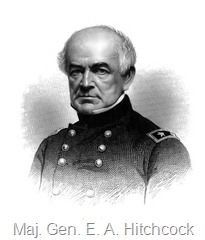June 8.—This day a scouting party under Lieut. Bonse, company A, Tenth Virginia regiment, captured, in Braxton County, Va., Ben. Haymond, Ed. Riffle and Stan. Conrad, three of the most notorious bushwhackers in Western Virginia. Haymond and Riffle had been cutting telegraph wires, robbing Union men, stealing horses, etc.—Cincinnati Gazette, June 11.
—An extension of the following military departments of the United States was made:
1. The Department of the Mississippi is extended so as to include the whole of the States of Tennessee and Kentucky. All officers on duty in those States will report to Major-Gen. Halleck.
2. The Mountain Department is extended eastward to the road running from Williamsport to Martinsburgh, Winchester, Strasburgh, Harrisonburgh, and Staunton, including that place—thence in the same direction southward until it reaches the Blue Ridge chain of mountains; thence with the line of the Blue Ridge to the southern boundary of the State of Virginia.
3. The Department of the Shenandoah is extended eastward to include the Piedmont District and the Bull Mountain range.
—General Prim, commanding the Spanish forces recently sent to Mexico, together with his suite, visited the army of the Potomac to-day.
—General Fremont attacked (Stonewall) Jackson seven miles beyond Harrisonburgh, Va., near Union Church or Cross Keys, at half-past eight this morning, and drove him from a strong position with considerable loss.—(Doc. 18.)
—The obsequies of General Turner Ashby of the rebel cavalry, were celebrated at Charlottesville, Va. “The services were performed by the Rev. Mr. Norton and Rev. Mr. Avery—the latter had been chaplin in the cavalry from the opening of the war. Both spoke of the deceased in terms of high praise as a man, a soldier, and a Christian. The brave soldiers wept as they listened to the pious exhortations of the clergymen. They had lost a host in Gen. Ashby, but they were expected to imitate him in all things, and especially in his veneration and respect for Christianity. The country looked to them for deeds of greater valor than had ever yet been accomplished by them; and there, on the dead body of their late commander, they should swear not to sheathe their swords when a hostile army polluted the soil of Virginia and the South. After the services in the chapel the remains of General Ashby were conveyed to the University cemetery and committed ‘earth to earth, ashes to ashes, and dust to dust,’ Colonel T. G. Randolph and the Professors of the University assisting in the ceremony. They grave was covered by the cavalry, and they fired several volleys over it, and there he will remain in this classic ground until the last trump shall summon all to the general judgment”—Lynchburgh Republican, June 12.
—Judge Swayne, of Memphis, Tenn., refused to open the Criminal Court in that city, after receiving an order from Col. G. N. Fitch, commanding United States forces, instructing him to confine himself to the hearing and adjudication of such cases only as are not based upon the recognition of the right of a State to secede from the Union, or upon the presumption of the establishment or existence of a so-called Southern Confederacy, or recognizing the same.
—A small force of Union troops, commanded by Capt. V. Geary, Third Pennsylvania cavalry, while on a reconnoissance in the vicinity of New Market, Va., captured a rebel spy named Hance. He was the medium by which letters were carried to and fro, giving the rebels much information concerning the movements of the Union army. When captured he had a mail made up, ready to carry into Richmond.
—A reconnoissance was this day made, under cover of eight Union gunboats, by a body of National troops, commanded by Colonel Morrow, on James Island, S. C. The Union forces drove the rebels a distance of two miles, and were at one time within three miles of the city of Charleston, and in full view of Fort Sumter. The object of the reconnoissance was accomplished, and the troops fell back to their former position, losing two killed and seven wounded.



